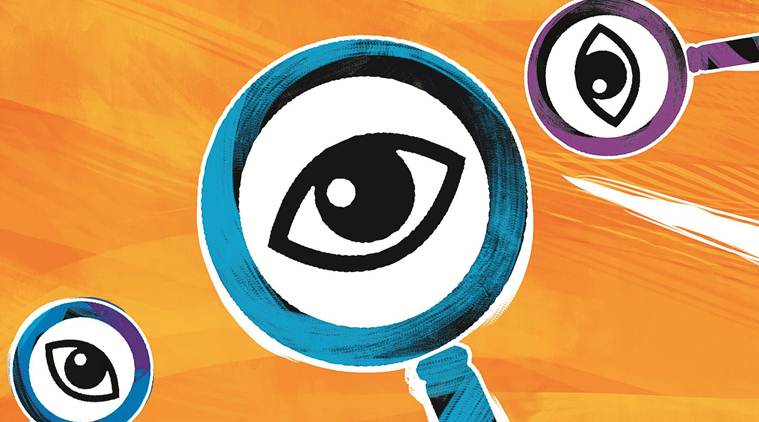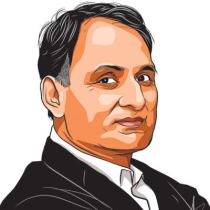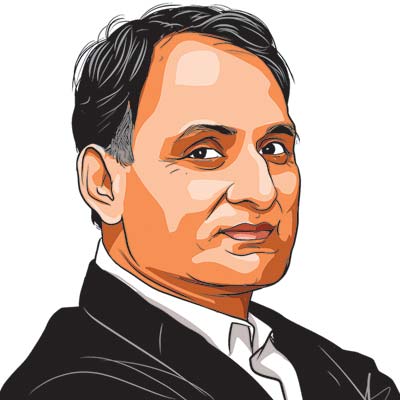Understand the RSS
Its critics want to deny space to the RSS. The Sangh wants to engage with all shades of political opinion and intellectuals and revive the tradition of debate.

In the past, socialists including Ram Manohar Lohia, Jayaprakash Narayan and Madhu Limaye, Congress leaders Sampoornanand or Pattabhi Sitaramayya, communists including Hiren Mukherjee and Bhupesh Gupta sought to understand the RSS from their respective perspectives. (Illustration: Suvajit Dey)
The Rashtriya Swayamsevak Sangh’s invitation to intellectuals and politicians of different ideological and political shades to understand the organisation’s perspective of the nation has triggered consternation among those who deride the organisation and its philosophy as a negation of the “Idea of India”. Recently, the Congress president Rahul Gandhi even compared the RSS with the Muslim Brotherhood.
At least two generations of pseudo-secular politicians and intellectuals have been groomed in an anti-RSS climate in university campuses and intellectual clubs. But in the first three decades after Independence, the disagreements between the RSS and the forces opposed to it were not at war with each other. Its critics knew the RSS philosophy and, therefore, were flexible whenever the country’s social and political institutions faced a crisis. They solicited each others’ help to further democracy.
In the 1950s, Prime Minister Jawaharlal Nehru accepted a proposal of the food secretary to engage the RSS in a food campaign. Around the same time, the Congress Working Committee passed a resolution welcoming RSS cadres into the party. This was part of correcting the mistake the Congress government had committed by falsely accusing the RSS of complicity in Mahatma Gandhi’s assassination. In 1967, the RSS played a vital role in building an anti-Congress alliance with the socialists and even the Communist Party of India (CPI). A decade later, the RSS played a critical role in the fight against the Emergency. These facts are suppressed by academicians and intellectuals affiliated with pseudo-secular forces.
The anti-RSS camp deliberately ignores the Sangh’s socio-economic programmes since these reflect the organisation’s true character. The RSS has been running more than 1,70,000 projects all over the country to empower the poorest of the poor. The Seva Bharati may be unknown to urban intellectuals, but it is adored by the poor and the marginalised. Ekal Vidyalay, with 75,000 schools under it, has reached those who have been deprived of education for generations. Many hospitals, blood and eye banks affiliated to the RSS have come up in the last three decades. Even the Naxalites recognise the importance of the RSS activities among tribals. The Bharatiya Mazdoor Sangh (BMS), the trade union affiliated to the RSS, has been a part of the joint front including the AITUC and CITU, unions of the CPI and CPM respectively, for the past three decades. Yet, the pseudo seculars unhesitatingly shout that the “RSS is dangerous”.
In the past, socialists including Ram Manohar Lohia, Jayaprakash Narayan and Madhu Limaye, Congress leaders Sampoornanand or Pattabhi Sitaramayya, communists including Hiren Mukherjee and Bhupesh Gupta sought to understand the RSS from their respective perspectives. Therefore, their opposition was ideological. The present-day pseudo secularists lack ideological rigour and use anti-RSSism as both ideology and programme; they believe that the RSS does not deserve legitimate space.
A review of the anti-RSS literature proves that this trend has its roots in the past. Govind Sahay, a Congressman, wrote in his tract, RSS: Hitler’s Heirs, that “RSS today is in the nature of a mystery. And it seems to be in the interest of the Sangh leadership to deliberately magnify and intensify that mystery. Only then perhaps they think they can exploit the ignorance of the people and make them believe whatever is likely to appear to be most appealing to them”. In her work, RSS: Is it a political organization?, Subhadra Joshi, who was close to both the Congress and the Left and headed Sampradayikata Vidrodhi Committee, wrote that the RSS followed “Hitlerite methods of extermination” and its cadres were trained in the use of lathi and dagger to smash skulls and cut throats. There are many such writings that have no basis in truth.
New Age, the CPI mouthpiece, on January 5, 1969 issue, declared that the RSS reminds one of the Nazi stormtroopers. Veteran communist leader C Rajeswara Rao called the RSS a “menace to Motherland” in New Age dated January 12, 1969. New Age (June 28, 1970) ran an article, “A day in the RSS camp”, where the author, Suresh Mishra, said “… these camps are nothing but places where Hindu boys are trained in murder and violence in the pattern of Hitler…” Years later, New Age (November 25, 1984) wrote an editorial (“Lessons not learnt”) where it repeated an old allegation: “No patriotic minded Indian can ever forget that it was British imperialism which partitioned our country on communal lines… which culminated in the assassination of Mahatma Gandhi at the hands of the RSS fanatic called Nathuram Godse”. These marginal views of the past have become the main argument of the Left liberals.
The critics of RSS are deluded in thinking that the Sangh’s fortunes are dependent on power politics. Had it been so, the RSS would not have been the strongest in Kerala or could not have expanded in India’s Northeast. Its concept of nation-building encompasses all dimensions of life, which has increasingly led to the expansion of the RSS in the economic, cultural, social spheres of national life. Its critics fail to understand that the RSS can’t be engaged from a reductionist viewpoint.
The invitation extended by the RSS to all shades of political opinion and intellectuals to engage with its vision is an attempt to revive the healthy tradition of debate. Two extreme views can coexist if they do not challenge each other’s existence. The story of Yajnavalkya and his two wives is illuminating. Both had been engaged in a debate on the question, “What constitutes the core of life?” While Maitreyi stood for spiritual salvation, Katyayni argued for material pleasure. They held extreme and opposite views and followed their respective paths without having hate or contempt for the other.
Democracy becomes a way of life when people internalise the fact that diversity in thought is as natural as building a consensus. In fact, dialogue is the essence of democracy. In India’s recent history, the Constituent Assembly debates stand out like a lamp post for democracy. Extreme and contradictory views held by its members did not create bitterness. When Sarsanghchalak Mohan Bhagwat invited former President, Pranab Mukherjee, to an RSS function, critics read political motives in the invitation. The Sangh unhesitatingly invites people who hold perspectives different from that of the RSS.
Bhagwat recognises that it is the moral responsibility of the RSS to correct the perspective about it. Electoral battle is an integral part of a democracy, but it should not cause the nation to remain fractured and live with a blinkered vision.
The writer is a Rajya Sabha MP. ‘Bharat of future: An RSS Perspective’, a three-day lecture series by RSS Sarsanghchalak Mohan Bhagwat begins today
For all the latest Opinion News, download Indian Express App
More From Dr Rakesh Sinha
- Hedgewar, for posterityDialogue with those he disagreed with, struggle for free India, marked his political life...
- Mis-reading archbishop’s letterAnti-RSSism must not obscure that it is part of an organised smear campaign..
- Category confusionsFour dominant narratives about the nature of the RSS run parallel to each other. Most do not understand the organisation’s ethos...








































No hay comentarios:
Publicar un comentario